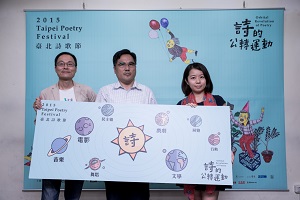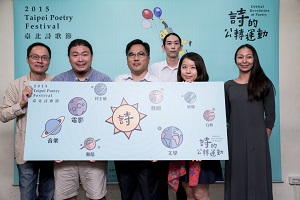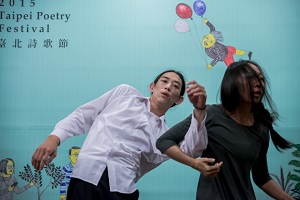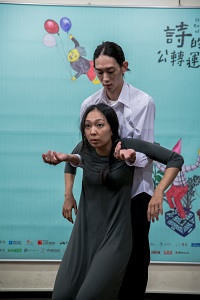World-renowned poets appear at Taipei Poetry Festival
By Yali Chen Since 2000, Taipei has been hosting poetry festivals featuring friendliness, diversity and crossovers. The event is a crossover art festival centering on poetry rather than a social gathering for poets mingling with each other. In 2015, themed Orbital Revolution of Poetry, the festival has invited world-renowned poets from France, the U.K., Italy, Macedonia, Japan, Hong Kong, and China to read their poems and exchange ideas with Taiwanese poets and audiences. Syrian-French poet Adonis, nominated for Nobel Prize several times, is set to visit Taiwan from Oct. 24 through Oct. 25. Poetry lovers in Taiwan now have a chance to see him appear here for the first time. Adonis, the greatest living poet of the Arab world, has been writing poetry for 70 years. In 1930, he was born in a farmer’s family, and had no early formal schooling. Aged 17, he showed his precocious talent for poetry. A Syrian-born poet, critic and essayist, Adonis led a modernist revolution in the second half of the 20th century, exerting a seismic influence on Arabic poetry comparable to TS Eliot’s in the anglophone world. He moved to Paris in 1985 and now lives on the outskirts of Paris, beyond la Défense, with his wife, Khalida Said, a literary critic. Adonis’ poetry narrates life, shines with aesthetics, and offers a place of refuge for each and every soul. In 2011, he was the Born in 1964, Xue serves as dean of the Department of Arabic Studies at Beijing Foreign Studies University. He has devoted his energies to research and translation of modern Arabic literature and culture. Japanese poet Yomota Inuhiko also specializes in the Arabian world. Born in 1953, he graduated from the University of Tokyo in religious studies, and continued in graduate school there to study comparative literature and culture. In Tokyo, he taught at Meiji Gakuin University until he retired in 2012. One of the most prolific authors, Yomota has published more than a hundred books, including three collections of poetry – The Explosion of the Eyes, Beggar of Life, and My Purgatory. Nikola Madzirov is one of Macedonia’s most distinguished poets. The Macedonian poet, editor, and translator Madzirov was born in 1973 in Strumica to a family of Balkan War refugees. Madzirov’s poetry examines both personal and cultural geography in order to trace the nature of our movement across those landscapes. He has published poetry, essays and translations. His works have also been translated into more than forty languages. Now he serves as poetry editor for the Macedonian online journal Blesok and as Macedonian coordinator for the international poetry network – Lyrikline. Born in 1980 in Singapore, Fiona Sze-Lorrain is a poet, literary translator, editor, and zheng harpist. Sze-Lorrain received her university education as a scholar at Columbia University, New York University and Paris IV-Sorbonne, where she obtained a PhD in French. She lives in France now. Her debut collection of poetry, Water the Moon, was published in 2010. My Funeral Gondola (2013) was her second book of poetry. In addition to her own writing, Sze-Lorrain translates poetry and non-fiction in English, French and Chinese. Her translation includes several contemporary French and American authors, and contemporary Chinese poets from Zephyr Press. Sze-Lorrain is also a zheng harpist who has performed worldwide. She studied mainly with world-renowned zheng master Wang Chang-yuan. In recent years, she has been working with several European musicians, exploring jazz and avant-garde compositions on the ancient Chinese harp. Hong Kong-based poet Tang Siu-wa is a cultural critic, literary organizer, and human rights activist. She is the author of two poetry collections, and one of the founding members of the House of Hong Kong Literature. Tang’s poetry and prose won Awards for Creative Writing in Chinese. She now teaches creative writing at various Hong Kong institutions, and contributes columns and criticism to a wide variety of local media, such as Ming Pao, Hong Kong Economic Times, and City Magazine. Born in Kingston Upon Thames in 1981, Luke Kennard grew up in Luton. With a PhD from the University of Exeter, Kennard now lectures in creative writing at the University of Birmingham, specializing in teaching poetry and writing for the stage and screen. He also writes fiction and short stories. Born in Milano, Italy, Alessandro Bosetti is a composer, performer and sound artist currently based in Berlin. Most of his works delve on musicality of spoken language, utilizing misunderstandings, translations and interviews as compositional tools. Bosetti has been presenting pieces for voice and electronics blurring the line between electro acoustic composition, aural writing and performance. He is slated to perform with French sound artist Yannick Dauby on November 1 at Thinkers’ Theater in Taipei. They aim to explore the boundary of cross-sensual experiences. Another poetry performance, titled Orbital Revolution of Poetry, will be given on November 7 at the Zhongzheng Auditorium in the Taipei Zhongshan Hall. Performers include the Langsan Theatre, Yu Yen-fang, the Against Again Troupe, and Lhundup Tsering. International poets, such as Fiona Sze-Lorrain and Luke Kennard, and local poets, including Lee Min-yung, Li Khin-huann, Xin Mu, and Adaw Palaf, also appear on stage to read their poems. During the 16-day festival, eight seminars will be held, including dialogues between poets and poetry translators from France, the U.K., Macedonia, Japan, Hong Kong, and Taiwan. Dialogues span the spectrum, with a wide variety of themes and perspectives, presenting Taiwanese audiences with a banquet of poetry. From Oct. 24 through Nov. 8, the Democratic Wall of Poetry has been set up at the plaza of MoCA Taipei (Museum of Contemporary Art, Taipei). Two interactive poems created by Xiang Yang are inscribed on the wall, with blanks left. Anyone can come to fill them out, joining the group creation and sparking that unexpected poetic encounter. For more information, please go to the official website at http://www.poetryfestival.taipei/htm/index.php (in Chinese and English versions) or call 0916-956-829.
STAFF WRITER The 2015 Taipei Poetry Festival has kicked off with a wide range of events including two poetry performances, four master features, eight seminars, three poems in action, and one poetry installation. All events are free and open to the public. Curated by two local poets Hung Hung and Yang Chia-hsien, the festival will run until Nov. 8.
The 2015 Taipei Poetry Festival has kicked off with a wide range of events including two poetry performances, four master features, eight seminars, three poems in action, and one poetry installation. All events are free and open to the public. Curated by two local poets Hung Hung and Yang Chia-hsien, the festival will run until Nov. 8. first Arab writer to win the Goethe prize in Germany. During Adonis’ stay in Taipei, his trusted Chinese translator Xue Qing-guo from Beijing will interpret the complicated mind of Adonis.
first Arab writer to win the Goethe prize in Germany. During Adonis’ stay in Taipei, his trusted Chinese translator Xue Qing-guo from Beijing will interpret the complicated mind of Adonis. In 2005, the British poet and critic won an Eric Gregory award for his first collection of prose poems – The Solex Brothers. Two years later, his second collection of poetry, The Harbour Beyond the Movie, made him the youngest-ever poet to be short-listed for the Forward Poetry Prize for Best Collection. His first fiction publication, Holophin, won the Saboteur Award for Best Novella 2013. In 2014 Kennard was named as one of the Next Generation Poets by the Poetry Book Society.
In 2005, the British poet and critic won an Eric Gregory award for his first collection of prose poems – The Solex Brothers. Two years later, his second collection of poetry, The Harbour Beyond the Movie, made him the youngest-ever poet to be short-listed for the Forward Poetry Prize for Best Collection. His first fiction publication, Holophin, won the Saboteur Award for Best Novella 2013. In 2014 Kennard was named as one of the Next Generation Poets by the Poetry Book Society. Titled Dancing with My Back towards You, one site-specific performance connecting local affections with history is choreographed by the up-and-coming choreographer Yu Yen-fang. Yu took inspiration from poet Tsao Kai’s math poem. Interpreted by local dancers and actors, Tsao’s work has brought poetry back to real life through dance. A total of eight shows will take place on Oct. 31, Nov. 1, Nov. 7 and Nov. 8 at the Taipei MRT K12 Underground Street.
Titled Dancing with My Back towards You, one site-specific performance connecting local affections with history is choreographed by the up-and-coming choreographer Yu Yen-fang. Yu took inspiration from poet Tsao Kai’s math poem. Interpreted by local dancers and actors, Tsao’s work has brought poetry back to real life through dance. A total of eight shows will take place on Oct. 31, Nov. 1, Nov. 7 and Nov. 8 at the Taipei MRT K12 Underground Street.

![Taiwan.gov.tw [ open a new window]](/images/egov.png)
